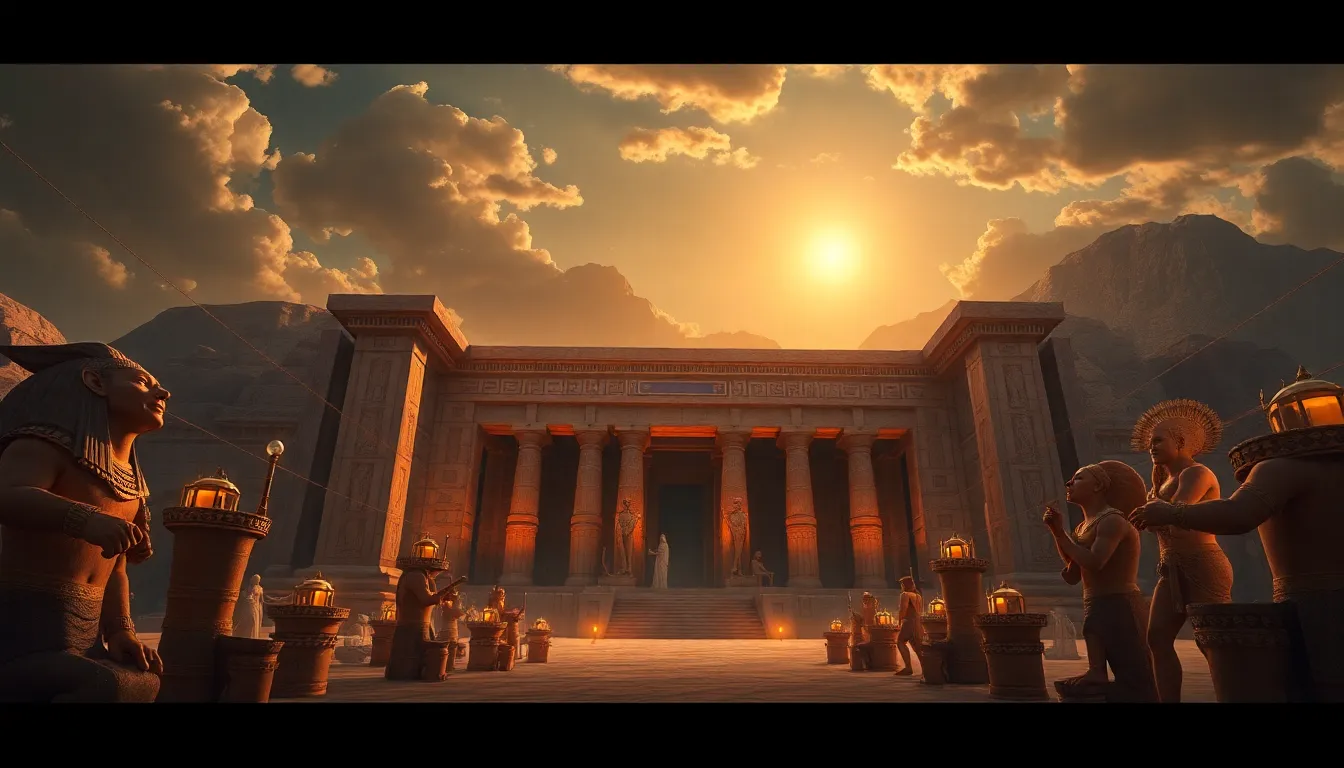The Temple of Toth: The Wisdom of the Ages
I. Introduction
The Temple of Toth stands as a monumental testament to the ancient Egyptian reverence for wisdom and knowledge. Dedicated to Toth, the god of wisdom, writing, and magic, this temple embodies the intellectual pursuits of a civilization that greatly valued literacy and learning. Toth’s role in ancient Egyptian mythology was paramount, influencing everything from the creation narratives to the practices surrounding the afterlife. This article aims to explore the historical context, architectural features, rituals, and modern interpretations of the Temple of Toth, shedding light on its enduring significance.
II. Historical Context
Toth was worshiped during various periods of ancient Egyptian history, particularly flourishing in the Old and Middle Kingdoms. The cultural landscape of ancient Egypt was rich, with a pantheon of gods and goddesses, each fulfilling specific roles in the lives of the people. Toth was revered not just as a deity of wisdom but also as a mediator and scribe of the gods.
- The time period of Toth’s worship: Toth was particularly prominent from around 3000 BCE to the end of the Ptolemaic period.
- The cultural and religious landscape: Ancient Egyptian society was deeply religious, with a complex belief system intertwining mythology, daily life, and governance.
- Key historical figures: Notable figures, such as Imhotep, a high priest of Toth, contributed to the advancement of medicine and architecture, reflecting Toth’s influence on knowledge and power.
III. Architectural Features of the Temple
The Temple of Toth was renowned for its intricate design and symbolic architecture. The layout often included a series of halls and sanctuaries, each adorned with hieroglyphics and carvings that depicted Toth’s wisdom and achievements.
- Design elements and symbolism: The temple was typically constructed using massive stone blocks, representing stability and permanence. The presence of water symbols, such as ponds, highlighted the importance of creation and renewal.
- Comparison with other ancient temples: Unlike the grand temples of Ra or Amun, the Temple of Toth often emphasized scholarly pursuits, with libraries and study areas integrated into its design.
- Unique artifacts and inscriptions: Archaeologists have discovered numerous artifacts, including papyrus scrolls and tools used for writing, that reflect Toth’s association with literacy and knowledge.
IV. The Role of Toth in Egyptian Mythology
Toth was not only a god of wisdom but also a key figure in various myths and beliefs surrounding creation and the afterlife. His contributions extended beyond mere documentation; he was seen as a creator god in his own right.
- Toth as the god of wisdom, writing, and magic: Toth’s knowledge was believed to encompass all aspects of wisdom, making him a central figure in the education of both gods and humans.
- Toth’s contributions to the creation myth: According to some myths, Toth played a crucial role in the creation of the world, using his intellectual prowess to bring order from chaos.
- The significance of Toth in afterlife beliefs: He was responsible for recording the deeds of the deceased, ensuring that their souls were judged fairly in the afterlife.
V. The Temple’s Influence on Knowledge and Learning
The Temple of Toth served as a central hub for education and scholarship in ancient Egypt. It attracted scholars, scribes, and students who sought to learn the sacred arts of writing and knowledge.
- The Temple as a center for education: The temple housed extensive libraries with texts on mathematics, medicine, and philosophy.
- Notable scholars and texts: Figures such as the philosopher and priest Hermes Trismegistus are often associated with the temple’s teachings, blending Greek and Egyptian thought.
- The legacy of Toth’s wisdom: The intellectual traditions fostered at the Temple of Toth influenced not only ancient Egyptian society but also later civilizations, including the Greeks and Romans.
VI. Rituals and Practices at the Temple
The rituals performed at the Temple of Toth were vital for both individual and communal wisdom. These ceremonies were designed to invoke Toth’s blessings and enhance the understanding of the participants.
- Description of ceremonies: Rituals often included offerings of incense and bread, as well as recitations of sacred texts.
- The role of priests and priestesses: The temple was staffed by a dedicated group of priests and priestesses who performed daily rituals, guiding the community in their spiritual and educational pursuits.
- The importance of rituals: Through these practices, individuals sought not only personal enlightenment but also collective wisdom that would benefit the entire community.
VII. Modern Interpretations and Discoveries
In recent years, archaeological discoveries related to the Temple of Toth have shed new light on ancient Egyptian beliefs and practices. Ongoing research continues to unveil the depths of Toth’s wisdom and its influence on contemporary thought.
- Archaeological findings: Excavations have revealed lost texts and artifacts that underscore the temple’s role as a center of learning.
- The impact of Toth’s wisdom: Modern thinkers, especially in the fields of psychology and philosophy, often reference Toth’s teachings as foundational to understanding human thought and creativity.
- Ongoing research: Scholars are continuously uncovering new aspects of the temple’s history and its relevance to our understanding of ancient knowledge systems.
VIII. Conclusion
The Temple of Toth remains a symbol of the profound wisdom and knowledge that characterized ancient Egyptian civilization. Toth’s significance as a god of wisdom, writing, and magic continues to resonate, reminding us of the importance of learning and understanding in both ancient and modern contexts. As we explore the legacy of the Temple of Toth, we recognize its enduring influence on the pursuit of knowledge and the quest for enlightenment in our own lives.




